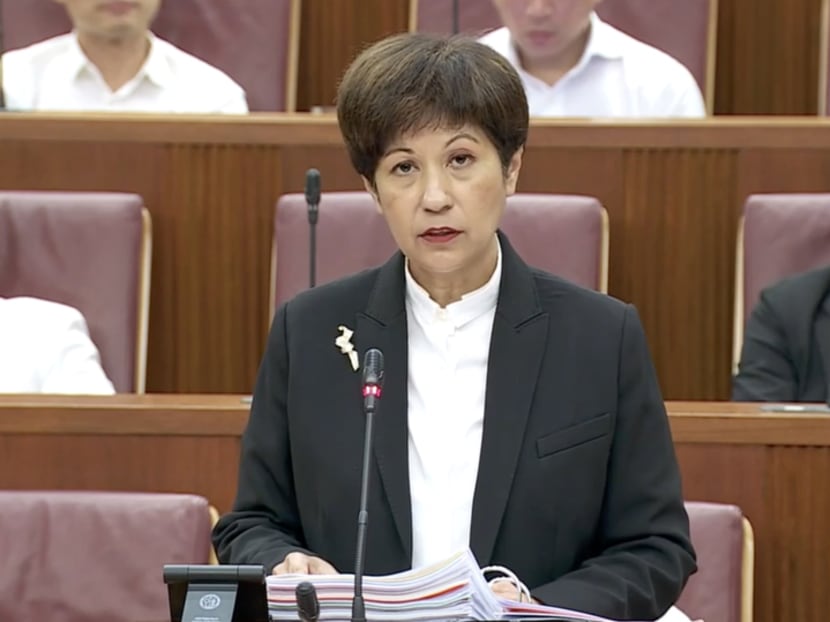Keppel bribery: Indranee Rajah crosses swords with MPs over decision not to prosecute ex-senior executives
SINGAPORE — Robust exchanges unfolded in Parliament in Monday (Feb 6) over a decision not to prosecute six ex-senior management personnel at a subsidiary of conglomerate Keppel Corporation who were caught up in a major bribery scandal.

Ms Indranee Rajah, Minister in the Prime Minister's Office, speaking in Parliament on Feb 6, 2023.
- Several MPs had terse exchanges with Ms Indranee Rajah over a decision not to prosecute six former senior employees of a Keppel unit
- She said that there was not enough evidence to prosecute the ex-employees of Keppel Offshore & Marine over a bribery scandal
- In their supplementary questions, three MPs asked about the details of the investigation and matters such as what board directors knew or should have known at the time the bribes were paid
SINGAPORE — Robust exchanges unfolded in Parliament in Monday (Feb 6) over a decision not to prosecute six ex-senior management personnel at a subsidiary of conglomerate Keppel Corporation who were caught up in a major bribery scandal.
One key question under the microscope involved what directors on earlier boards of Keppel and its subsidiary knew, or should have known, when huge bribes were paid to a Brazilian firm over many years. Keppel as a corporate entity has already admitted paying the bribes.
The key figures involved in Monday's exchanges were Ms Indranee Rajah, Minister in the Prime Minister's Office, and three Members of Parliament (MPs), one of them from the ruling People's Action Party (PAP) and two from the opposition Workers' Party (WP).
In responding to questions from more than 10 MPs, Ms Indranee reiterated an earlier statement from the Corrupt Practices Investigation Bureau (CPIB) in consultation with the Attorney-General's Chambers (AGC).
She said that the decision not to pursue prosecutions was a result of "insufficient evidence to establish their guilt beyond a reasonable doubt".
"Beyond a reasonable doubt" is the standard of proof that the prosecution must meet in criminal trials where accused persons contest the charges against them.
The MPs' questions covered issues such as the impact of the decision on Singapore's zero-tolerance approach to corruption.
The case involved Keppel Offshore & Marine (O&M), one of the world's leading oil rig makers, and a unit of one of Singapore's top conglomerates, Keppel Corp. Keppel O&M eventually paid out S$422 million in fines in a deal brokered by the United States.
At the time, the corruption scandal was called a "black eye for Singapore Inc" given its clean reputation on corruption.
In an agreed statement of facts signed with the United States Department of Justice in 2017, Keppel O&M admitted that it had paid large bribes to secure 13 projects in Brazil between 2001 and 2014.
CPIB had investigated six unnamed former senior management officials over the corruption case and gave them stern warnings last month.
A former senior member of Keppel O&M's legal department, Jeffrey Chow, had cut a deal with US authorities to help prosecutors in their probe of the company and other former executives, reported Reuters in 2017.
According to a court document filed in August 2017, Chow was charged for creating and executing false agreements for the company, which falsely represented that payments were being made to an agent for his services, when in fact portions of the payments were being paid as bribes.
Ms Indranee said on Monday: “In deciding whether to charge, the (public prosecutor) has to consider whether he has the necessary evidence to prove that those individuals were involved in certain conduct and possessed a certain mental state, to establish the offences.”
She added that CPIB’s media release had stated that there were “evidentiary difficulties” getting enough evidence.
After her speech, MPs Tan Wu Meng of Jurong Group Representation Constituency (GRC), Leader of the Opposition Pritam Singh (Aljunied GRC), and his fellow WP member Sylvia Lim (Aljunied GRC) asked supplementary questions.
The following are edited excerpts of Ms Indranee’s exchanges with the three MPs. (The exchanges include the legal term "constructive knowledge". This refers to knowledge that a person is presumed to have had because the person should reasonably have possessed that knowledge.)
DID KEPPEL DIRECTORS HAVE 'CONSTRUCTIVE KNOWLEDGE' OF THE BRIBE?
Mr Pritam Singh: I would like to confirm if police investigations and CPIB investigations included determining the constructive knowledge of the Keppel board of directors at the material time when corrupt payments were made to secure contracts in Brazil? That means not the current board (as of 2017 and 2018) that the minister referred to in 2018.
(In 2018, when the decision to defer prosecution came to light, at a parliamentary sitting back then, Mr Singh had asked a supplementary question of Ms Indranee, then in her capacity as Senior Minister of State for Law, about the state of knowledge of the boards of Keppel Corp and its unit Keppel O&M over the corrupt payments. Strict laws govern the way that directors must keep themselves informed of relevant information as well the way that they owe a legal duty — known as a fiduciary duty — to act in the best interests of shareholders.)
Ms Indranee: Can I just seek to understand, is the Leader of the Opposition indicating or suggesting that constructive knowledge is an offence under the Prevention of Corruption Act?
Mr Singh: No, minister. I was referring to a Keppel press release that the minister directed me to in 2018, which indicated that the current board of Keppel was not aware of these corrupt payments.
So my supplementary question today deals with the constructive knowledge of the board at the material time, not the current board that was referred to in 2017, because these corrupt payments actually go back well beyond 2017. That's the whole point of the question.
Ms Indranee: CPIB only investigates offences. If constructive knowledge is not an offence, then there is no reason for CPIB to be investigating this. CPIB investigates offences under the Prevention of Corruption Act, and that is what it has done. And in this case, unfortunately, there's insufficient evidence for it to mount a prosecution.
Mr Singh: The point really isn't whether that in itself is an offence, but what it can lead to in terms of identifying individuals who could be identified as knowing more and being aware of or signing off on checks or whatever the payment process was of corrupt payments.
It's not so much the constructive knowledge itself. It's about the entire (body) of facts and how that could potentially identify individuals for prosecution since Keppel has already been dealt with as a corporate entity.
Ms Indranee: This much I can say — whatever CPIB has been able to do or to uncover or to ask in its investigations in Singapore with respect to Keppel, it has done. But the problem is not so much what it has been doing (for) the investigations here.
The problem is that key material witnesses are not available. And that is the problem. That is the hurdle that it has not been able to overcome. And that is why charges have not been referred.
ON DIFFICULTY OF GETTING ENOUGH EVIDENCE
Dr Tan Wu Meng: Can I confirm with the minister that every effort will continue to be made internationally through mutual legal assistance requests as needed, working with other overseas authorities, to obtain additional facts as needed, that may be required to bring persons responsible to justice as fast as possible within Singapore's laws and legal ambit?
Secondly, can I also highlight the speech by the current Attorney General (AG) at the Singapore Law Review lecture 2017 on prosecution in the public interest? The current AG said and I quote: “If we are convinced that a serious offence has been committed, we will not hesitate to act simply because securing a conviction may be an uphill task.”
Can I ask the minister if we are aware of the assessment by the AG and the public prosecutor, which the minister said didn't reach the threshold beyond reasonable doubt? Was it assessed that the prosecution would be an uphill task in and of itself or outright impossible given the available facts?
Ms Indranee: Let me start first with this reference to the speech by the AG. The background of that speech was offences against minors where it is particularly difficult to get evidence. So I think that the question is not whether or not it's... an uphill task.
The correct test is what the AG has described — it is that there must be a reasonable prospect of obtaining a conviction, because there must be a certain threshold. Otherwise, if you just go around filing charges with insufficient basis, that would not make for a strong justice system.
ON DISCREPANCY OF STATEMENTS BY FOREIGN WITNESS
Ms Sylvia Lim: I have two clarifications for the minister. Firstly, did CPIB personally interview in Singapore all the six persons who were warned? And was CPIB not able to obtain any incriminating statements from these six persons?
The second clarification is regarding a foreign witness whom she mentioned could have provided useful evidence in court. May I confirm that she’s referring to the former head of legal of Keppel O&M?
And if so, is she saying that whatever he told the US court in terms of the fact that he drafted agreements to facilitate the bribery scheme, in conjunction with approval from the seniors whoever they are, he's repudiating all that now in front of CPIB?
Ms Indranee: My understanding is that CPIB has not had any admissions or confessions from the six persons.
The second clarification about the foreign witness, I will refer back to my earlier answer, where I actually said two things.
I said there's one foreign witness who gave evidence in other proceedings, which could have been relevant to establishing offences in Singapore. But that foreign witness is not willing to voluntarily give evidence in Singapore.
Number two, some members may ask that the prosecution could be advanced arising out of the fact that a particular individual had entered into a plea bargain in another jurisdiction. So that's a separate individual in relation to his involvement in the Keppel O&M bribery.
And when this individual was investigated by CPIB on his return to Singapore, he denied knowing that commissions paid to the agents in Brazil were paid out as bribes.
And he didn't, during CPIB investigations here, implicate himself or others in conspiring to pay bribes.
So the question is, has he said something different here? I think the answer is yes. But I will not go into details.
Firstly, I don't have details of what exactly was said. But I do know and I am able to say, based on what has been informed to me, that in this particular case, what was said in the US and what has been told to CPIB, there are differences.











